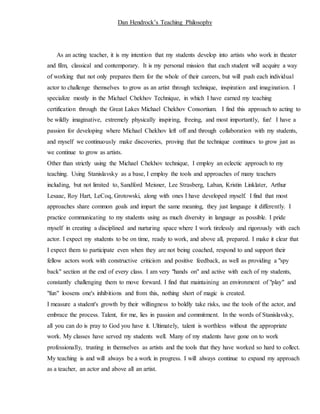
Dan Hendrock’s Teaching Philosophy
- 1. Dan Hendrock’s Teaching Philosophy As an acting teacher, it is my intention that my students develop into artists who work in theater and film, classical and contemporary. It is my personal mission that each student will acquire a way of working that not only prepares them for the whole of their careers, but will push each individual actor to challenge themselves to grow as an artist through technique, inspiration and imagination. I specialize mostly in the Michael Chekhov Technique, in which I have earned my teaching certification through the Great Lakes Michael Chekhov Consortium. I find this approach to acting to be wildly imaginative, extremely physically inspiring, freeing, and most importantly, fun! I have a passion for developing where Michael Chekhov left off and through collaboration with my students, and myself we continuously make discoveries, proving that the technique continues to grow just as we continue to grow as artists. Other than strictly using the Michael Chekhov technique, I employ an eclectic approach to my teaching. Using Stanislavsky as a base, I employ the tools and approaches of many teachers including, but not limited to, Sandford Meisner, Lee Strasberg, Laban, Kristin Linklater, Arthur Lesaac, Roy Hart, LeCoq, Grotowski, along with ones I have developed myself. I find that most approaches share common goals and impart the same meaning, they just language it differently. I practice communicating to my students using as much diversity in language as possible. I pride myself in creating a disciplined and nurturing space where I work tirelessly and rigorously with each actor. I expect my students to be on time, ready to work, and above all, prepared. I make it clear that I expect them to participate even when they are not being coached, respond to and support their fellow actors work with constructive criticism and positive feedback, as well as providing a "spy back" section at the end of every class. I am very "hands on" and active with each of my students, constantly challenging them to move forward. I find that maintaining an environment of "play" and "fun" loosens one's inhibitions and from this, nothing short of magic is created. I measure a student's growth by their willingness to boldly take risks, use the tools of the actor, and embrace the process. Talent, for me, lies in passion and commitment. In the words of Stanislavsky, all you can do is pray to God you have it. Ultimately, talent is worthless without the appropriate work. My classes have served my students well. Many of my students have gone on to work professionally, trusting in themselves as artists and the tools that they have worked so hard to collect. My teaching is and will always be a work in progress. I will always continue to expand my approach as a teacher, an actor and above all an artist.